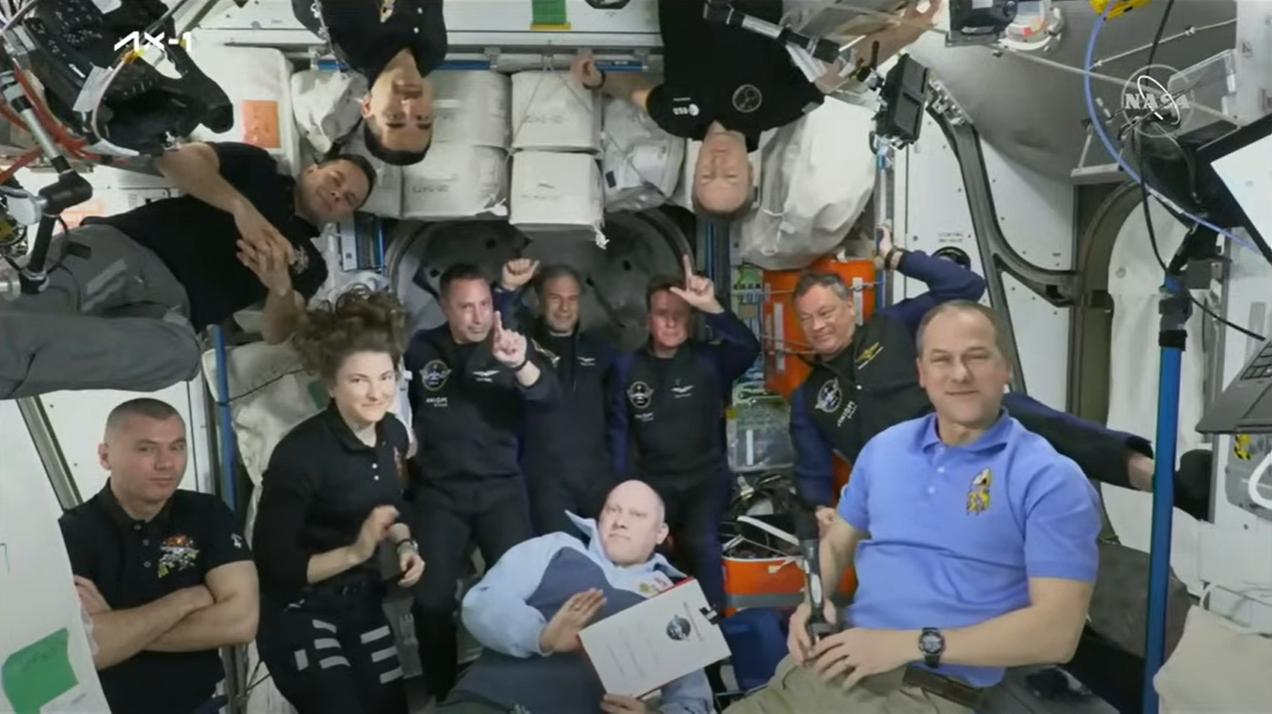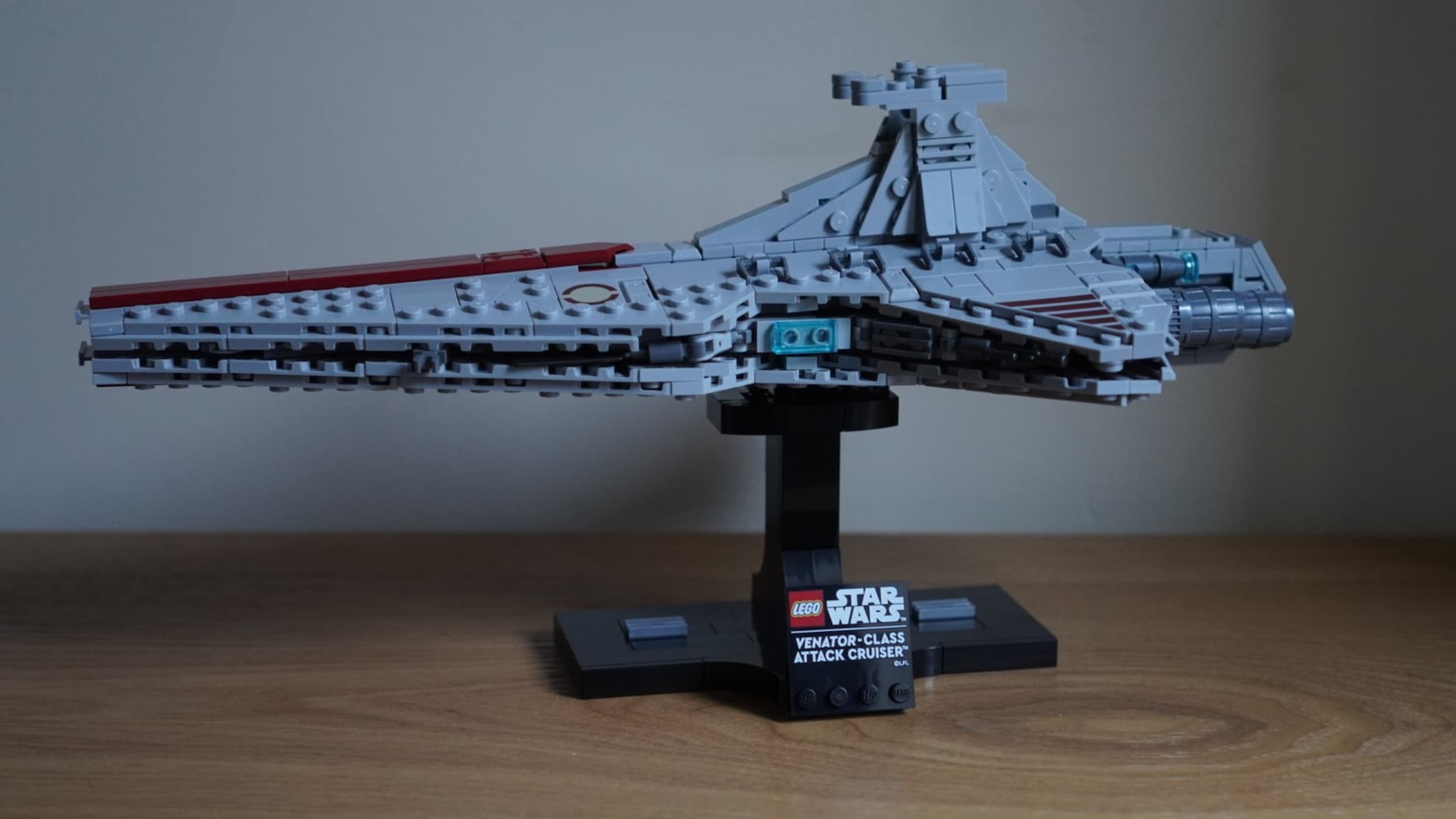Former astronauts must chaperone private missions to the International Space Station, NASA says
NASA wants all private crewed missions to the ISS to be chaperoned by a former agency astronaut.

Breaking space news, the latest updates on rocket launches, skywatching events and more!
You are now subscribed
Your newsletter sign-up was successful
Want to add more newsletters?
NASA will require that all private astronaut missions to the International Space Station (ISS) have an experienced former agency astronaut at the helm.
A new solicitation notice released by the agency requires that privately run crewed missions to the orbiting lab be led by a retired NASA astronaut. The new rule builds off the experience of Axiom Space's first mission to the ISS this past April, which the agency referred to as a "recent civilian-crew spaceflight." (The solicitation was first noticed by SpaceNews.)
The change is still being finalized. If accepted, it will put former NASA astronauts in charge to provide "experienced guidance for the private astronauts during pre-flight preparation through mission execution,” the document states.
Photos: The first space tourists
Putting a former NASA astronaut at the helm reduces risk to International Space Station operations and boosts the safety of the orbiting complex as well as the private mission, the solicitation states. In addition, such an individual would serve as "a link between the resident ISS expedition crew and the private astronauts," the solicitation adds.
While not required by NASA before, Axiom Space put this protocol into practice on its debut mission to the ISS. That flight, known as Ax-1, flew retired NASA astronaut Michael López-Alegría as commander of the four-person crew in April; the other three crew members had no spaceflight experience. The upcoming Ax-2 mission will be commanded by retired NASA astronaut Peggy Whitson and will launch no earlier than fall 2022.
López-Alegría acknowledged in recent comments that his crew required help from the Expedition 67 crew on board the ISS to complete all mission objectives, confirming media reports in May from former NASA astronaut Susan Helms.
Breaking space news, the latest updates on rocket launches, skywatching events and more!
In comments at a recent conference, López-Alegría called the European Space Agency's Matthias Maurer a "fourth crew member" for Ax-1. "We couldn't have done it without them," López-Alegría added, referring to Maurer and the other professional astronauts onboard the ISS at the time.
In comments posted on YouTube, López-Alegría told the ISS Research and Development Conference on July 28 that, despite months of training, his crew was "overwhelmed" by the adjustments that working in microgravity imposed.
The Ax-1 crew had to get used to simple actions such as realizing that putting a pencil "down" would see it float away, he said.
"We didn't allow enough time for that," López-Alegría said. For for the first six or seven days of the mission, he added, "there was no break; people were staying up late, not getting enough sleep. It was arduous."
While the intense schedule was very similar to that of space shuttle missions, López-Alegría said there was a difference in how his crew was trained. Old space shuttle crews with professional astronauts used to be trained and "choreographed" to an exact timeline, using a simulator that included hardware very similar to what was flown in space, he said.
"We didn't have time to do all that, so it was a challenge for us," López-Alegría added of his Ax-1 crew training.
He also acknowledged that the discussion about former agency astronauts helming Axiom crews had already come up during planning discussions for Ax-1. "It became pretty clear, first of all, that customers really didn't want to fly with nobody who has done it before," López-Alegría said. "Secondly, NASA was a lot more comfortable having someone who had been there before."
While Axiom will be making changes to its own procedures to account for the experience of Ax-1, NASA is adding other changes in its solicitation to ensure that research plans are communicated further ahead of time, "no later than 12 months prior to the launch date," as the solicitation states.
Former NASA astronaut Susan Helms previously pointed to impacts that Ax-1 had on the Expedition 67 crew's workload.
"In essence, the arrival of the Axiom personnel seemed to have a larger-than-expected impact on the daily workload on the professional International Space Station crew," Helms, the chair of the Aerospace Safety Advisory Panel, said during a May 12 meeting, as reported by SpaceNews.
While Ax-1's arrival posed "no apparent overt safety issues" to Expedition 67, Helms said the private crew's extra needs caused some changes to the ISS flight crew timelines.
The situation, she said, posed "opportunity cost in the form of overly stressing the workload of the onboard ISS members and the mission controllers who support them on the ground." Helms recommended additional training for future private astronaut missions to keep this issue from happening again.
Follow Elizabeth Howell on Twitter @howellspace. Follow us on Twitter @Spacedotcom and on Facebook.

Elizabeth Howell (she/her), Ph.D., was a staff writer in the spaceflight channel between 2022 and 2024 specializing in Canadian space news. She was contributing writer for Space.com for 10 years from 2012 to 2024. Elizabeth's reporting includes multiple exclusives with the White House, leading world coverage about a lost-and-found space tomato on the International Space Station, witnessing five human spaceflight launches on two continents, flying parabolic, working inside a spacesuit, and participating in a simulated Mars mission. Her latest book, "Why Am I Taller?" (ECW Press, 2022) is co-written with astronaut Dave Williams.
